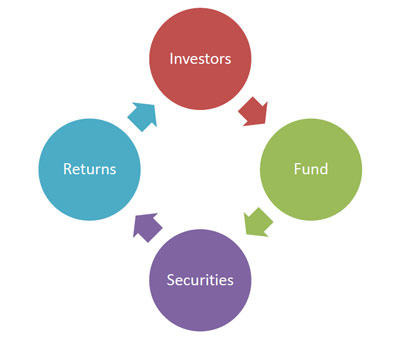How does Mutual Fund work?

Common Terms - Mutual Funds
NAV
Net asset value NAV represents the market value of each unit of a fund or the price at which investors
can buy or sell units. The NAV is generally calculated on a daily basis, reflecting the combined market value of the shares,
bonds and securities (as reduced by allowable expenses and charges) held by a fund on any particular day.
Debt Funds
Debt Funds help bring stability to your investment portfolio since they are lower in risk as compared to
Equity Funds, yet riskier than Liquid Funds and their aim itself is to generate steady returns while preserving your capital.
These would typically invest in government securities, NCD, CDs, CPs bonds and other fixed income securities as well as lend money
to large organisations or Corporates, in return of a fixed interest rate. Therefore, investing in Debt Mutual Funds would be ideal
if you’re looking at a potentially higher return than Liquid Funds over a medium term time horizon, between 3 to 24 months.
Sale Price
It is the price you pay when you invest in a scheme and is also called "Offer Price". It may include a sales load.
Repurchase Price
It is the price at which a Mutual Funds repurchases its units and it may include a back-end load.
This is also called Bid Price.
Redemption Price
It is the price at which open-ended schemes repurchase their units and close-ended schemes redeem their units on maturity.
Such prices are NAV related.
Sales Load / Front End Load
It is a charge collected by a scheme when it sells the units.
Also called, ‘Front-end’ load. Schemes which do not charge a load at the time of entry are called ‘No Load’ schemes.
Repurchase / 'Back-end' Load -
It is a charge collected by a Mutual Funds when it buys back / Repurchases the units from the unit holders.